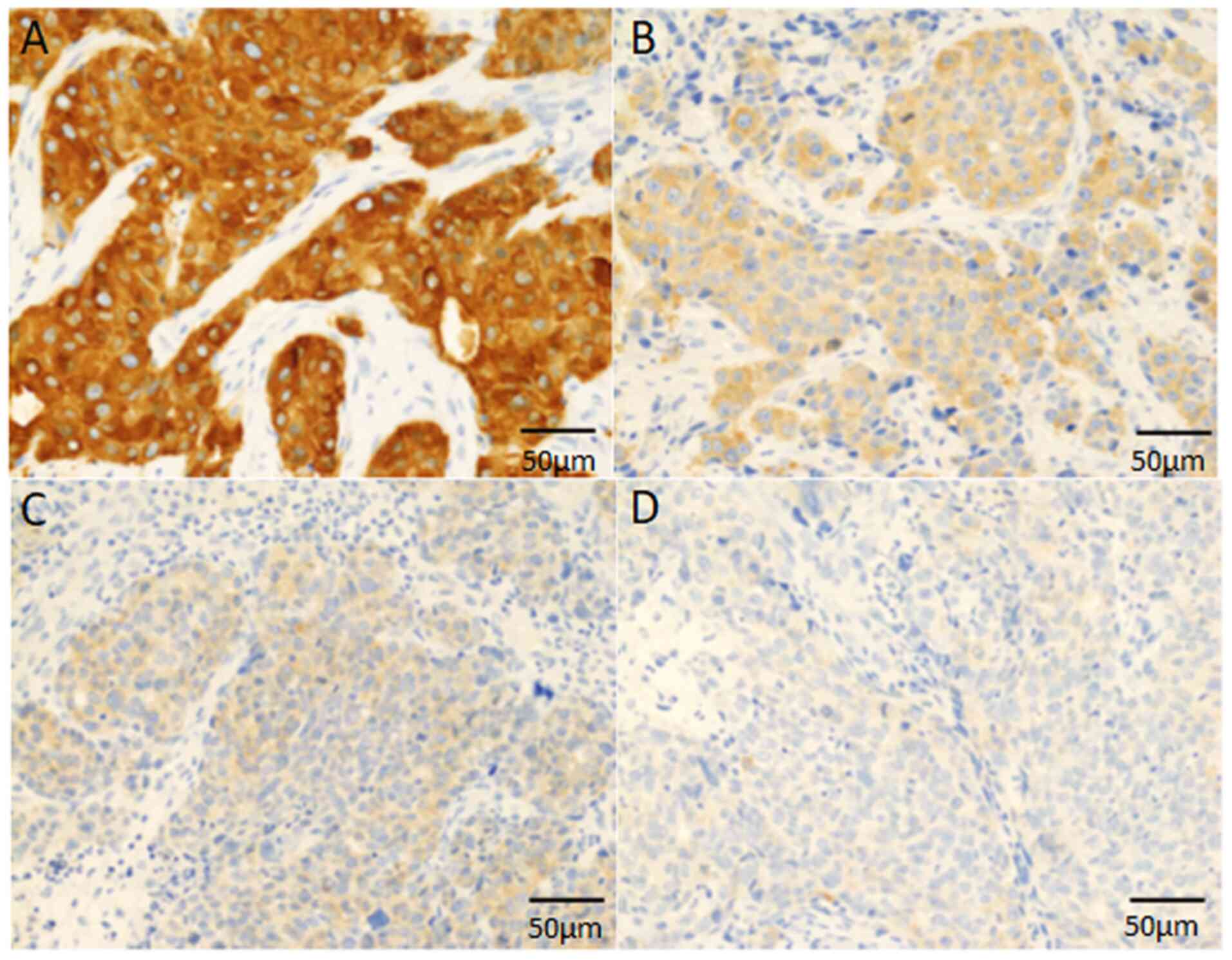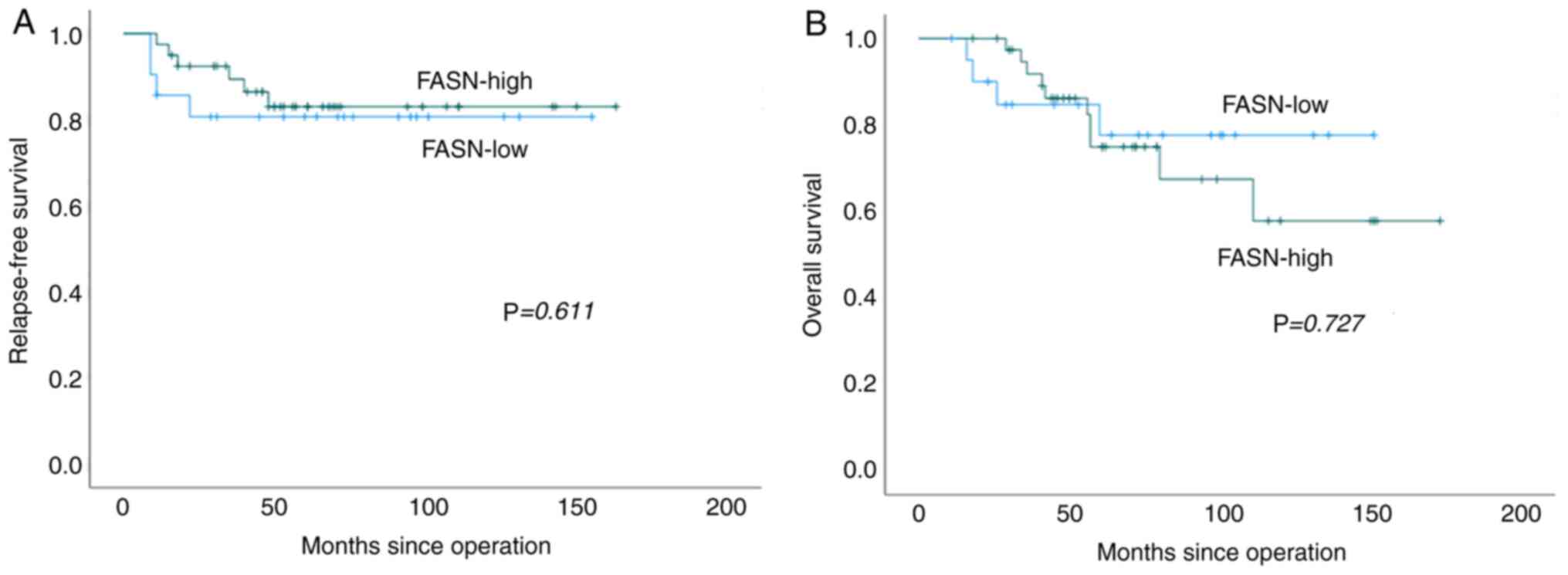|
1
|
Cleator S, Heller W and Coombes RC:
Triple-negative breast cancer: Therapeutic options. Lancet Oncol.
8:235–244. 2007.PubMed/NCBI View Article : Google Scholar
|
|
2
|
Dent R, Trudeau M, Pritchard KI, Hanna WM,
Kahn HK, Sawka CA, Lickley LA, Rawlinson E, Sun P and Narod SA:
Triple-negative breast cancer: Clinical features and patterns of
recurrence. Clin Cancer Res. 13:4429–4434. 2007.PubMed/NCBI View Article : Google Scholar
|
|
3
|
Carey LA, Perou CM, Livasy CA, Dressler
LG, Cowan D, Conway K, Karaca G, Troester MA, Tse CK, Edmiston S,
et al: Race, breast cancer subtypes, and survival in the carolina
breast cancer study. JAMA. 295:2492–2502. 2006.PubMed/NCBI View Article : Google Scholar
|
|
4
|
Metzger-Filho O, Tutt A, De Azambuja E,
Saini KS, Viale G, Loi S, Bradbury I, Bliss JM, Azim HA Jr, Ellis
P, et al: Dissecting the heterogeneity of triple-negative breast
cancer. J Clin Oncol. 30:1879–1887. 2012.PubMed/NCBI View Article : Google Scholar
|
|
5
|
Moreno-Sánchez R, Rodríguez-Enríquez S,
Marín-Hernández A and Saavedra E: Energy metabolism in tumor cells.
FEBS J. 274:1393–1418. 2007.PubMed/NCBI View Article : Google Scholar
|
|
6
|
Porporato PE, Payen VL, Baselet B and
Sonveaux P: Metabolic changes associated with tumor metastasis,
part 2: Mitochondria, lipid and amino acid metabolism. Cell Mol
Life Sci. 73:1349–1363. 2016.PubMed/NCBI View Article : Google Scholar
|
|
7
|
Straub BK, Gyoengyoesi B, Koenig M,
Hashani M, Pawella LM, Herpel E, Mueller W, Macher-Goeppinger S,
Heid H and Schirmacher P: Adipophilin/perilipin-2 as a lipid
droplet-specific marker for metabolically active cells and diseases
associated with metabolic dysregulation. Histopathology.
62:617–631. 2013.PubMed/NCBI View Article : Google Scholar
|
|
8
|
Bickel PE, Tansey JT and Welte MA: PAT
proteins, an ancient family of lipid droplet proteins that regulate
cellular lipid stores. Biochim Biophys Acta. 1791:419–440.
2009.PubMed/NCBI View Article : Google Scholar
|
|
9
|
Sztalryd C and Kimmel AR: Perilipins:
Lipid droplet coat proteins adapted for tissue-specific energy
storage and utilization, and lipid cytoprotection. Biochimie.
96:96–101. 2014.PubMed/NCBI View Article : Google Scholar
|
|
10
|
Fujimoto M, Yoshizawa A, Sumiyoshi S,
Sonobe M, Menju T, Hirata M, Momose M, Date H and Haga H:
Adipophilin expression in lung adenocarcinoma is associated with
apocrine-like features and poor clinical prognosis: An
immunohistochemical study of 328 cases. Histopathology. 70:232–241.
2017.PubMed/NCBI View Article : Google Scholar
|
|
11
|
Hashimoto Y, Ishida M, Ryota H, Yamamoto
T, Kosaka H, Hirooka S, Yamaki S, Kotsuka M, Matsui Y, Yanagimoto
H, et al: Adipophilin expression is an indicator of poor prognosis
in patients with pancreatic ductal adenocarcinoma: An
immunohistochemical analysis. Pancreatology. 19:443–448.
2019.PubMed/NCBI View Article : Google Scholar
|
|
12
|
Yoshikawa K, Ishida M, Yanai H, Tsuta K,
Sekimoto M and Sugie T: Adipophilin expression is an independent
marker for poor prognosis of patients with triple-negative breast
cancer: An immunohistochemical study. PLoS One.
15(e0242563)2020.PubMed/NCBI View Article : Google Scholar
|
|
13
|
Menendez JA and Lupu R: Fatty acid
synthase and the lipogenic phenotype in cancer pathogenesis. Nat
Rev Cancer. 7:763–777. 2007.PubMed/NCBI View
Article : Google Scholar
|
|
14
|
Díaz KP, Gondak R, Martins LL, de Almeida
OP, León JE, Mariano FV, Altemani A and Vargas PA: Fatty acid
synthase and Ki-67 immunoexpression can be useful for the
identification of malignant component in carcinoma ex-pleomorphic
adenoma. J Oral Pathol Med. 48:232–238. 2019.PubMed/NCBI View Article : Google Scholar
|
|
15
|
Ogino S, Nosho K, Meyerhardt JA, Kirkner
GJ, Chan AT, Kawasaki T, Giovannucci EL, Loda M and Fuchs CS:
Cohort study of fatty acid synthase expression and patient survival
in colon cancer. J Clin Oncol. 26:5713–5720. 2008.PubMed/NCBI View Article : Google Scholar
|
|
16
|
Abdelrahman AE, Rashed HE, Elkady E,
Elsebai EA, El-Azony A and Matar I: Fatty acid synthase, Her2/neu,
and E2F1 as prognostic markers of progression in non-muscle
invasive bladder cancer. Ann Diagn Pathol. 39:42–52.
2019.PubMed/NCBI View Article : Google Scholar
|
|
17
|
Giró-Perafita A, Sarrats A, Pérez-Bueno F,
Oliveras G, Buxó M, Brunet J, Viñas G and Miquel TP: Fatty acid
synthase expression and its association with
clinico-histopathological features in triple-negative breast
cancer. Oncotarget. 8:74391–74405. 2017.PubMed/NCBI View Article : Google Scholar
|
|
18
|
Hirai H, Tada Y, Nakaguro M, Kawakita D,
Sato Y, Shimura T, Tsukahara K, Kano S, Ozawa H, Okami K, et al:
The clinicopathological significance of the adipophilin and fatty
acid synthase expression in salivary duct carcinoma. Virchows Arch.
477:291–299. 2020.PubMed/NCBI View Article : Google Scholar
|
|
19
|
Rakha EA, Allison KH, Bu H, Ellis IO,
Foschini MP, Horii R, et al: Invasive breast carcinoma of no
special type. In: WHO Classification of Tumours, 5th edition.
Breast Tumours IARC, Lyon, pp102-109, 2019.
|
|
20
|
Yoshikawa K, Ishida M, Yanai H, Tsuta K,
Sekimoto M and Sugie T: Prognostic significance of PD-L1-positive
cancer-associated fibroblasts in patients with triple-negative
breast cancer. BMC Cancer. 21(239)2021.PubMed/NCBI View Article : Google Scholar
|
|
21
|
Yoshikawa K, Ishida M, Yanai H, Tsuta K,
Sekimoto M and Sugie T: Immunohistochemical analysis of CD155
expression in triple-negative breast cancer patients. PLoS One.
16(e0253176)2021.PubMed/NCBI View Article : Google Scholar
|
|
22
|
Elston CW and Ellis IO: Pathological
prognostic factors in breast cancer. I. The value of histological
grade in breast cancer: Experience from a large study with
long-term follow-up. Histopathology. 19:403–410. 1991.PubMed/NCBI View Article : Google Scholar
|
|
23
|
Wu Q, Ma G, Deng Y, Luo W, Zhao Y, Li W
and Zhou Q: Prognostic value of Ki-67 in patients with resected
triple-negative breast cancer: A meta-analysis. Front Oncol.
9(1068)2019.PubMed/NCBI View Article : Google Scholar
|
|
24
|
Kusakabe T, Maeda M, Hoshi N, Sugino T,
Watanabe K, Fukuda T and Suzuki T: Fatty acid synthase is expressed
mainly in adult hormone-sensitive cells or cells with high lipid
metabolism and in proliferating fetal cells. J Histochem Cytochem.
48:613–622. 2000.PubMed/NCBI View Article : Google Scholar
|
|
25
|
Khan W, Augustine D, Rao RS, Patil S, Awan
KH, Sowmya SV, Haragannavar VC and Prasad K: Lipid metabolism in
cancer: A systematic review. J Carcinog. 20(4)2021.PubMed/NCBI View Article : Google Scholar
|
|
26
|
Zhang J, Song Y, Shi Q and Fu L: Research
progress on FASN and MGLL in the regulation of abnormal lipid
metabolism and the relationship between tumor invasion and
metastasis. Front Med. 15:649–656. 2021.PubMed/NCBI View Article : Google Scholar
|
|
27
|
Ali A, Levantini E, Teo JT, Goggi J,
Clohessy JG, Wu CS, Chen L, Yang H, Krishnan I, Kocher O, et al:
Fatty acid synthase mediates EGFR palmitoylation in EGFR mutated
non-small cell lung cancer. EMBO Mol Med. 10(e8313)2018.PubMed/NCBI View Article : Google Scholar
|
|
28
|
Aquino IG, Bastos DC, Cuadra-Zelaya FJM,
Teixeira IF, Salo T, Coletta RD and Graner E: Anticancer properties
of the fatty acid synthase inhibitor TVB-3166 on oral squamous cell
carcinoma cell lines. Arch Oral Biol. 113(104707)2020.PubMed/NCBI View Article : Google Scholar
|
|
29
|
de Andrade BA, León JE, Carlos R,
Delgado-Azañero W, Mosqueda-Taylor A, Graner E and de Almeida OP:
Expression of fatty acid synthase (FASN) in oral nevi and melanoma.
Oral Dis. 17:808–812. 2011.PubMed/NCBI View Article : Google Scholar
|
|
30
|
Jung YY, Kim HM and Koo JS: Expression of
lipid metabolism-related proteins in metastatic breast cancer. PLoS
One. 10(e0137204)2015.PubMed/NCBI View Article : Google Scholar
|
|
31
|
Jiang W, Xing XL, Zhang C, Yi L, Xu W, Ou
J and Zhu N: MET and FASN as prognostic biomarkers of triple
negative breast cancer: A systematic evidence landscape of clinical
study. Front Oncol. 11(604801)2021.PubMed/NCBI View Article : Google Scholar
|
|
32
|
Kuniyoshi S, Miki Y, Sasaki A, Iwabuchi E,
Ono K, Onodera Y, Hirakawa H, Ishida T, Yoshimi N and Sasano H: The
significance of lipid accumulation in breast carcinoma cells
through perilipin 2 and its clinicopathological significance.
Pathol Int. 69:463–471. 2019.PubMed/NCBI View Article : Google Scholar
|
|
33
|
Saarikoski ST, Rivera SP and Hankinson O:
Mitogen-inducible gene 6 (MIG-6), adipophilin and tuftelin are
inducible by hypoxia. FEBS Lett. 530:186–190. 2002.PubMed/NCBI View Article : Google Scholar
|
|
34
|
Ni T, He Z, Dai Y, Yao J, Guo Q and Wei L:
Oroxylin A suppresses the development and growth of colorectal
cancer through reprogram of HIF1α-modulated fatty acid metabolism.
Cell Death Dis. 8(e2865)2017.PubMed/NCBI View Article : Google Scholar
|
|
35
|
Chang R, Chou MC, Hung LY, Wang ME, Hsu MC
and Chiu CH: Study of valproic acid-enhanced hepatocyte steatosis.
BioMed Res Int. 2016(9576503)2016.PubMed/NCBI View Article : Google Scholar
|
|
36
|
Menendez JA and Lupu R: Fatty acid
synthase (FASN) as a therapeutic target in breast cancer. Expert
Opin Ther Targets. 21:1001–1016. 2017.PubMed/NCBI View Article : Google Scholar
|
|
37
|
Puig T, Turrado C, Benhamú B, Aguilar H,
Relat J, Ortega-Gutiérrez S, Casals G, Marrero PF, Urruticoechea A,
Haro D, et al: Novel inhibitors of fatty acid synthase with
anticancer activity. Clin Cancer Res. 15:7608–7615. 2009.PubMed/NCBI View Article : Google Scholar
|
|
38
|
Blancafort A, Giró-Perafita A, Oliveras G,
Palomeras S, Turrado C, Campuzano Ò, Carrion-Salip D, Massaguer i
Vall-llovera A, Brugada R, Palafox Sánchez M, et al: Dual fatty
acid synthase and HER2 signaling blockade shows marked antitumor
activity against breast cancer models resistant to anti-HER2 drugs.
PLoS One. 10(e0131241)2015.PubMed/NCBI View Article : Google Scholar
|
|
39
|
Qu H, Shan K, Tang C, Cui G, Fu G, Qi Y,
Cui J, Li J, Wang R, Feng N, et al: A novel small-molecule fatty
acid synthase inhibitor with antitumor activity by cell cycle
arrest and cell division inhibition. Eur J Med Chem.
219(113407)2021.PubMed/NCBI View Article : Google Scholar
|
|
40
|
Giró-Perafita A, Palomeras S, Lum DH,
Blancafort A, Viñas G, Oliveras G, Pérez-Bueno F, Sarrats A, Welm
AL and Puig T: Preclinical evaluation of fatty acid synthase and
EGFR inhibition in triple-negative breast cancer. Clin Cancer Res.
22:4687–4697. 2016.PubMed/NCBI View Article : Google Scholar
|
















